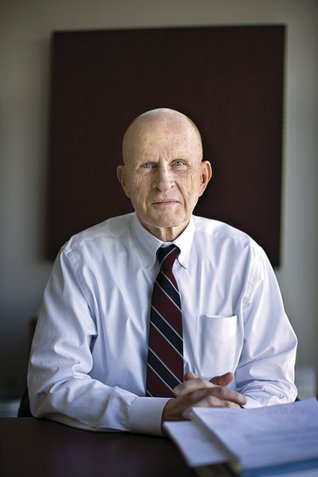
Retired U.S. Army Maj. Gen. Scott Smith, who serves on Nevada’s Veterans Services Commission and works with UNLV students who have served in the military, advises veterans to “take advantage of every educational benefit they can.”
Monday, March 30, 2009 | 2 a.m.
Retired Maj. Gen. Scott Smith served in the Army for 33 years and has a broad view of veterans issues. He serves on Nevada’s Veterans Services Commission and the national board of the First Calvary Division Association, and is director of the Institute of Security Studies at UNLV, where he interacts with students who are veterans.
Should Nevada veterans be writing their congressional delegation about any legislation?
Yes, on behalf of the Military Retirees Healthcare Protection Act, which would prevent the Defense Department from increasing health care fees, such as pharmacy and inpatient care co-payments. The military budget is squeezed, and the DOD has shown a proclivity to balance the budget on the backs of veterans. The bill says it’s the responsibility of Congress, not the DOD to deal with fees. This is a bill about control.
That sounds like an issue especially important to the large veteran retiree population in Las Vegas.
When you’re young and studly, unless you get shot, nothing ever goes wrong, but as you retire various parts of your anatomy need tweaking.
Are there any veteran-related issues before the state Legislature?
There is a bill that would allow each jurisdiction in the state to create a special court for veterans charged with nonviolent crimes. Veterans either suffering from PTSD or traumatic brain injury would be rehabbed rather than punished. It also provides for their records to be sealed.
What’s your advice for young veterans?
We live in a world now where young vets might have to reinvent themselves two or three times throughout their professional life. They should take advantage of every educational benefit they can.
Any challenges in taking advantage of the benefits?
A new GI Bill sprung out of the war on terror, but some of the benefits available in the old bill aren’t in this one. It does not have certain benefits that are important to people who want vocational careers. If a veteran learned to weld doing tank maintenance and wants to become a welder, the GI Bill does not provide for the certification training. Same thing for medics, military police and others whose interests are vocation and not going to college.
How did that happen?
I think its an unintentional consequence of Congress recently trying to help younger veterans. Now it’s a matter of reconciling the two GI Bills.

Join the Discussion:
Check this out for a full explanation of our conversion to the LiveFyre commenting system and instructions on how to sign up for an account.
Full comments policy